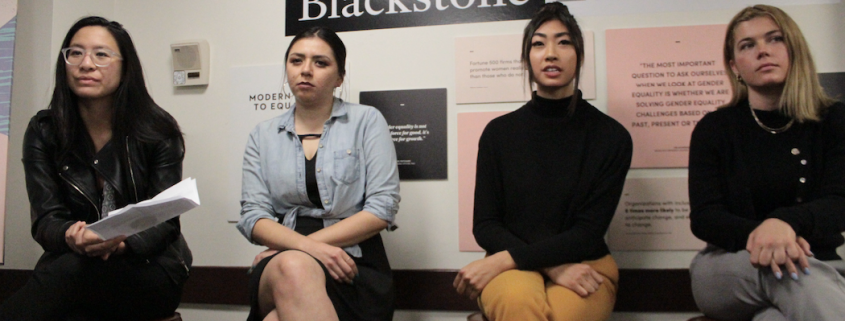Panel discusses women’s involvement in political activism

Approximately 40 students, faculty and staff on Wednesday night attended a panel discussion at Bridge Hall about women’s involvement in the political sphere. The event, hosted by The Female Quotient, a female-owned business dedicated to advancing gender equality in the workplace, focused on encouraging women to participate in civic engagement and activism.
“[I want to] lift up the stories of people who are typically underrepresented: women, women of color,” said event moderator Jaime Woo, a graduate student in the Annenberg School for Communication and Journalism. “All of the people here, all of the women here today can … channel [powerful] energy.”
Woo also co-wrote “Yes She Can,” which centers on the 10 young women who worked in the Obama administration. The book came to be recognized on The New York Times’ best-selling list.
Ignite, a nonpartisan organization that aims to empower women in politics, also co-sponsored the panel, which included Ignite leaders Gabriela Meza, a senior at UCLA, Lily Larsen, a freshman at Santa Monica College, and Mai Mizuno, a senior majoring in international relations and philosophy, politics and law at USC.
The panelists discussed what motivated each of them to get involved in the political sphere and what served as the impetus for their interest in activism.
Larsen, who grew up in Mid-City, Los Angeles, said her drive to serve in local politics stemmed from witnessing her friends face issues with law enforcement due to the lack of youth engagement programs.
“There really is a lack of opportunity in a lot of Los Angeles neighborhoods,” said Larsen, who is planning to run for Los Angeles City Council in 2020.
Meza, a first-generation immigrant from Mexico, said she was motivated to pursue politics after hearing President Donald Trump’s anti-immigrant rhetoric.
“I had to make this journey across the border to come for my education and everything [while] he’s out here calling us criminals, calling us all of these things right as he announced his campaign,” Meza said.
Mizuno said the 2016 presidential election prompted her to take a more active role in politics by getting involved in advocacy work around issues like educating youth about complex political issues like climate change.
“Now, our generation has to take charge,” Mizuno said. “There’s no one else doing it really or, at least, they’re not representing our interests.”
Meza said that after the election, she realized she could not give up on her activist efforts since Trump’s win posed a threat to the rights of people within the immigrant community.
“In that moment, I thought, ‘Now it’s real,’” Meza said. “Now, I really can’t give up on this organizing and Ignite or anything like that … [because] it’s really going to affect us in a different way, especially me and my community.”
The panelists said they hope the work of Ignite and other organizations in grassroots movements, and community engagement will help create cultural change across the country and achieve equality for all.
“It’s also about societal change and creating our own systems,” Meza said. “It’s really about breaking down those barriers of respectability as well, so we can fill that pipeline with all sorts of people.”
Meza said the societal barriers set in place restrict women of color from advocating for change, which can be especially tiring in the field of activism work.
“It’s exhausting,” Meza said. “You’re dealing with these systemic issues at the same time where you’re trying to fight them.”
When the panel opened up to questions from the audience, recent USC graduate Lynn Wang asked how to deal with issues like sexism and racism within advocacy organizations.
“Whenever [problematic behavior] comes up, I try and have an honest conversation with the people, especially if they’re on my own team, about why we have to continue to learn,” Mizuno said. “Even for me, every single activist space is really a learning process.”

